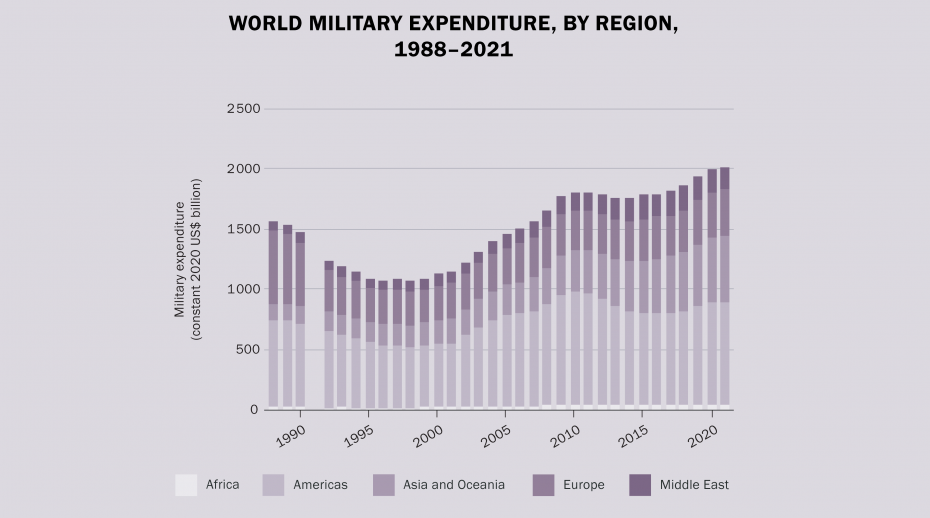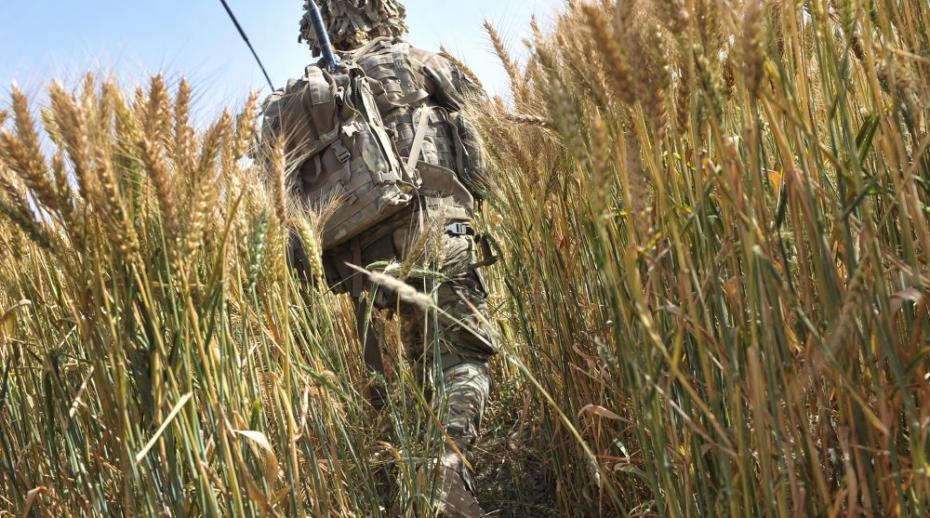|
| NEWS |
 |
| World military expenditure passes $2 trillion for first time |
| On 25 April, SIPRI published new data on global military spending. World military spending continued to grow in 2021, reaching an all-time high of $2.1 trillion. This was the seventh consecutive year that spending increased. The five largest spenders in 2021 were the United States, China, India, the United Kingdom and Russia, together accounting for 62 per cent of expenditure. |
|
|
Read more | Read the SIPRI Fact Sheet | Access the Military Expenditure Database
|
|
|
 |
| 2022 Stockholm Forum on Peace and Development: Online registration now open |
|
SIPRI is pleased to open online registration for the 2022 Stockholm Forum on Peace and Development, co-hosted by SIPRI and the Swedish Ministry for Foreign Affairs. The 2022 Stockholm Forum will convene on 23–25 May 2022. This year’s Forum will combine open high-level policy debates with invitation-only sessions, roundtables, workshops, debates, fireside chats and spotlight presentations on the theme ‘From a Human Security Crisis Towards an Environment of Peace’.
|
|
|
Read more | Register to attend the Forum online
|
|
|
 |
| New SIPRI film–Battlefields of the Future: Trends of Conflict and Warfare in the 21st Century |
|
This month, SIPRI launched a new film capturing insights from global actors on how developments in technology have altered the nature of warfare and have opened cyberspace and outer space as potential new battlefields of the future. The film is based on discussions recorded during the 2021 Stockholm Security Conference (SSC 21), which centred on the topic ‘Battlefields of the Future: Trends of Conflict and Warfare in the 21st Century’. The conference brought together leading experts and representatives from the political, military, academic and diplomatic communities, as well as civil society.
|
|
|
Read more | Watch the video
|
|
|
 |
| Spotlight: Ambassador Rüdiger Bohn |
| SIPRI also released a Spotlight video earlier this month featuring an interview with Ambassador Rüdiger Bohn in connection to SSC 21 on the topic of battlefields of the future. Ambassador Bohn is Deputy Federal Government Commissioner for Disarmament and Arms Control, Federal Foreign Office, Germany, which sponsored SSC 21. |
|
|
Watch the Spotlight video
|
|
|
| COMMENTARY |
 |
| War in the breadbasket: The ripple effects on food insecurity and conflict risk beyond Ukraine |
|
This month SIPRI issued a three-part blog series exploring threats to food security posed by the war in Ukraine. The first blog looks at the implications the war could have on food security worldwide. Russia and Ukraine account for just over half the global output of sunflower oil, 19 per cent of barley, 14 per cent of wheat and 4 per cent of maize. It is estimated that global supplies of major agricultural products will fall by 10–50 per cent due to the war. With the world already on the brink of a food crisis, war in one of the world’s foremost breadbasket regions could not have come at a more critical time. Dr Caroline Delgado writes that the war and the worsening global food insecurity that has followed is a stark reminder of the links that exist between hunger and conflict, and calls on global leaders to recognize and act on these links.
|
|
Read the SIPRI WritePeace Blog
|
|
|
 |
| War in the breadbasket: The impacts of the war in Ukraine on food security and stability in Lebanon |
|
In the second blog in the series exploring threats to food security posed by the war in Ukraine, Amal Bourhrous and Dr Kristina Tschunkert look at the case of Lebanon. The Middle East and North Africa region buys more than 50 per cent of Ukraine’s total wheat supply, and Lebanon is particularly reliant on wheat from the country. The blog explores what impact a looming food security crisis could have after a series of shocks and crises in Lebanon over the past few years. It concludes by emphasizing the importance that states show solidarity with Lebanon, that humanitarian actors delivering aid are given funding and that Lebanon, in the long term, makes structural changes to enhance its agricultural sector.
|
|
Read the SIPRI WritePeace Blog
|
|
|
 |
| War in the breadbasket: Hunger and the humanitarian fallout from the war in Ukraine |
|
Marie Riquier, in the third food security blog, addresses the humanitarian fallout from the war in Ukraine. Russia’s invasion has sparked a devastating humanitarian crisis in Ukraine, which will have implications for other crises across the globe. This in turn will impact global hunger. More civilians are likely to go to bed on an empty stomach, both in Ukraine and beyond. While there should unarguably be a focus on the suffering in Ukraine, the clock is also ticking in other crisis hotspots. Humanitarian organizations are forced to choose between feeding fewer people or feeding more with reduced food rations. This is an impossible choice. No one should face starvation in 2022 in a world where there is enough food to feed everyone.
|
|
Read the SIPRI WritePeace Blog
|
|
|
 |
| Explainer: The proposed hike in German military spending |
|
A few days after Russia launched its first airstrikes against the Ukrainian capital of Kyiv, German Chancellor Olaf Scholz did away with decades of political restraint and ushered in a new era of German foreign and security policy. He proposed the creation of a special fund of €100 billion (US$112 billion) to be spent on military procurement and pledged to allocate more than 2 per cent of Germany’s gross domestic product (GDP) to defence. In this blog piece, Alexandra Marksteiner discusses the proposal and its implications. If Scholz’s proposal is realized, it would represent the largest absolute increase in German military expenditure since at least World War II. The blog concludes by exploring the questions that remain unanswered.
|
|
Read the SIPRI WritePeace Blog
|
|
|
|
|
 |
| External articles |
|
The following articles by SIPRI experts and panellists were recently published:
|
|
|
|
|
|
| UPCOMING EVENTS |
| |
| 23–25 May 2022 |
| 2022 Stockholm Forum on Peace and Development |
|
SIPRI is proud to host the 2022 Stockholm Forum on Peace and Development on the theme ‘From a Human Security Crisis Towards an Environment of Peace’. From grassroot and corporate action to global policy decisions, diverse stakeholders and participants will explore policy approaches to address the intersection between environmental stress, human security and socio-intercultural interactions. The Forum sessions will pave the way for discussions at the Stockholm+50 Conference, hosted by Sweden on 1–3 June.
|
|
Read more
|
|
| |
| 23 May 2022 |
| 2022 SIPRI Lecture by HE Helen Clark |
|
SIPRI is proud to host the fourth annual SIPRI Lecture, held on the theme of ‘Environment of Peace’. The lecture will be delivered by Helen Clark, former Prime Minister of New Zealand and Administrator of the United Nations Development Programme. Clark is known for her lifelong career of public service and her dedication to the promotion of peace, inclusion and sustainability. Clark is also a panellist for SIPRI’s Environment of Peace initiative, which will launch a major report during the 2022 Stockholm Forum on Peace and Development.
|
|
Read more
|
|
| RECENT EVENTS |
| |
| 30 March 2022 |
| SIPRI hosts webinar on gender in disarmament and non-proliferation |
|
As part of the European Union Non-Proliferation and Disarmament Consortium (EUNPDC), SIPRI hosted a virtual seminar this month titled ‘Strengthening the Gender Focus in Disarmament and Non-proliferation’. The discussion focused on gender balance in disarmament diplomacy, gender-responsive arms control, linkage with the women and peace and security agenda, masculinities in disarmament, feminist foreign policy, institutional culture and barriers, and toolkits for the workplace.
|
|
Read more
|
|
| STAFF NEWS |
Two current openings
SIPRI is currently accepting applications for:
- Office Assistant (Closing date: 15 May).
- Armament and Disarmament Summer School: 28 August–2 September 2022 (Closing date: 1 May).
|
|
Read more
|
|
|
| PUBLICATIONS |
 |
| Trends in World Military Expenditure, 2021 |
|
In 2021 world military expenditure surpassed the two trillion US dollar mark for the first time, reaching $2113 billion. The economic effects of the Covid-19 pandemic have not ended the continuous upward trend in world military expenditure seen since 2015. As a result of the strong economic recovery across the globe in 2021, world military spending as a share of world gross domestic product—the global military burden—reached 2.2 per cent, down from 2.3 per cent in 2020. This Fact Sheet presents regional and national military expenditure data for 2021 and highlights trends over the decade 2012–21.
|
|
Read the SIPRI Fact Sheet
|
|
|
 |
| The European Union Training Mission in Mali: An Assessment |
| This SIPRI Background Paper provides an overview of the European Union Training Mission in Mali (EUTM Mali) and assesses its impact on Mali’s conflict dynamics since it was established in 2013. The third of three country-specific papers, it analyses EUTM Mali’s main training and advisory activities, before assessing its political and operational impacts. It concludes that EUTM Mali has made an impact in terms of military capacity building, but that further progress is needed to improve coordination with the Malian Armed Forces (Forces Armées Maliennes, FAMA). |
|
Read the SIPRI Background Paper
|
|
|
 |
| Hypersonic Boost-glide Systems and Hypersonic Cruise Missiles: Challenges for the Missile Technology Control Regime |
| An increasing number of states are pursuing hypersonic missile development programmes. Hypersonic missiles combine hypersonic speed and manoeuvrability, and some hypersonic missiles are developed as delivery systems both for nuclear and conventional payloads. The combination of these capabilities may have escalatory or destabilizing effects. It is key to ensure that the Missile Technology Control Regime’s (MTCR) guidelines and control list adequately cover hypersonic missiles and related goods and technologies. This paper seeks to improve the understanding of hypersonic missiles, increase awareness among policymakers and export control officials, and inform the ongoing technical and policy discussions within the MTCR to strengthen efforts to limit the proliferation of hypersonic missiles. |
|
Read the SIPRI Report
|
|
|
 |
| The World Food Programme’s Contribution to Improving the Prospects for Peace in Ethiopia |
| This report aims to explain and assess the contribution of the World Food Programme (WFP) Ethiopia’s climate adaptation and risk management programmes to peace in Ethiopia. The research focused on the Satellite Index Insurance for Pastoralists in Ethiopia (SIIPE) programme, a multidimensional programme that aims to enhance beneficiaries’ integrated risk management capacities. The results indicate that the SIIPE programme can potentially contribute to conflict reduction although there is a lack of clarity regarding the selection criteria for the programme. Based on these findings, the report makes recommendations to improve WFP’s contribution to the prospects for peace. |
|
Read the SIPRI Report
|
|
|
 |
| SIPRI Yearbook 2021 |
SIPRI Yearbook 2021 presents a combination of original data in areas such as world military expenditure, international arms transfers, arms production, nuclear forces, armed conflicts and multilateral peace operations with state-of-the-art analysis of important aspects of arms control, peace and international security. It covers developments during 2020, including:
- the state of nuclear arms control and the entry into force of the 2017 Treaty on the Prohibition of Nuclear Weapons;
- efforts to regulate lethal autonomous weapon systems, and state behaviour in cyberspace and space;
- regional and country-specific overviews of armed conflicts; and
- the impact of the unfolding Covid-19 pandemic and the UN appeal for a global ceasefire to address it.
|
|
Browse the contents page | Download the summary (PDF) |
Order SIPRI Yearbook 2021 | Download the sample chapter on world nuclear forces (PDF)
|
|
|
| |